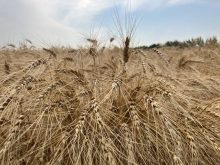Federal Agriculture Minister Gerry Ritz has called a Jan. 29 meeting in Ottawa on “the future of the barley industry” between the Canadian Wheat Board and a clutch of “industry groups, producers, grain handlers and malting companies.”
Ritz said the meeting will focus on “finding ways to move toward marketing choice for barley growers.”
In his news release Thursday, Ritz didn’t specify which groups would be invited to the meeting, which he said stems from “widespread criticism” of the CWB’s recently announced cash price option for malting barley, called CashPlus.
Read Also

Pea, lentil outlooks have some positive signals – Penner
As pulse growers consider what to plant this spring, Chuck Penner of Leftfield Commodities Research said there is some optimism in the Canadian pulse market. Penner gave a presentation at the Saskatchewan Pulse Growers meeting in Swift Current on Feb. 4.
Ritz noted grower groups, grain handlers and malting companies have panned CashPlus as “a half-measure falling far short of true marketing choice.”
Groups that went public with criticism of CashPlus, both before and after its release, have included the Malting Industry Association of Canada (MIAC), representing the country’s four biggest maltsters; the Western Grain Elevator Association, representing its larger grain handlers; and farmer groups including the Western Barley Growers Association, Western Canadian Wheat Growers and Market Choice Alliance.
“Be wary”
The Canadian Federation of Agriculture, meanwhile, went public Jan. 11 supporting CashPlus. CFA president Bob Friesen described it as “doing a good job of giving farmers more market options while still upholding its mandate to empower farmers through collective marketing.
“This is a new idea and like any new idea it should be given time to prove itself before people start to criticize,” he said. “Farmers should be particularly wary of corporate interests rushing forward to bash this program. Farmers need to ask themselves if these interests are really farmers’ interests.”
The National Farmers Union also backed the CWB’s move, but said there are pros and cons to the new barley pricing program and farmers should investigate both for themselves. CashPlus “offers the potential for higher returns, it also opens up the potential for lower prices — reflecting the risks of an open market,” the NFU wrote in a Jan. 10 statement.
Plus, “it is not the mandate of the CWB or farmers to maximize returns to maltsters and private grain companies,” said NFU president Stewart Wells.
Ritz, on the other hand, said Thursday that the CWB “has obviously ignored industry in putting this program together.
“Had they listened to growers and industry groups, they would have known that this alternative is unworkable. Now the CWB is forcing the program on the industry by refusing to sell new-crop malting barley to maltsters until they sign on to the new program.”
The MIAC publicly lodged that complaint Tuesday. Association president Phil de Kemp was quoted by Reuters as saying the maltsters have lost “significant” volumes of business as a result, though he didn’t offer any specific figures.
CWB spokesperson Maureen Fitzhenry, responding Tuesday to de Kemp’s statement in an article by Reuters reporter Roberta Rampton, said the board had not “issued a specific refusal” to sell new-crop barley.














